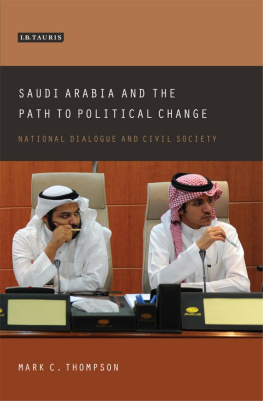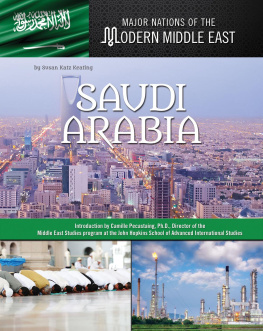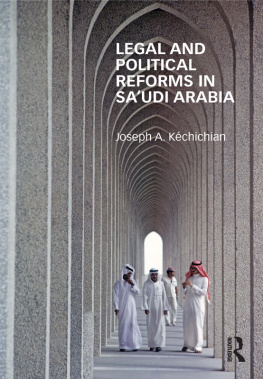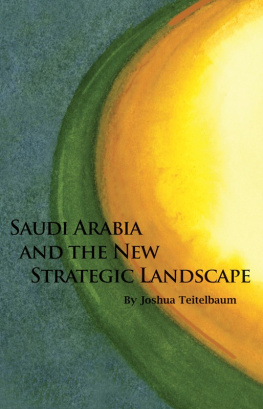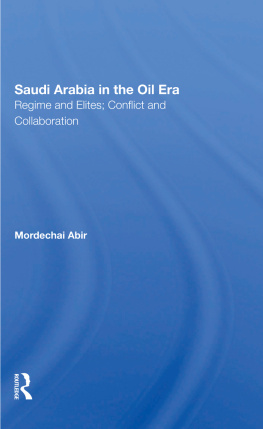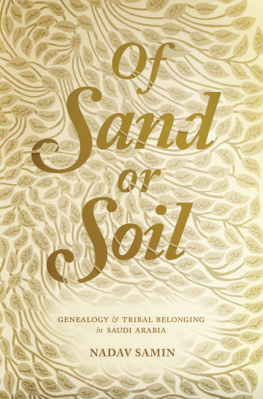Mark C. Thompson is Assistant Professor of Middle East Studies at King Fahd University of Petroleum and Minerals, Saudi Arabia. He completed his PhD in Arab and Islamic Studies from the University of Exeter. He has worked in Saudi Arabia intermittently since January 2001.

Published in 2014 by I.B.Tauris & Co Ltd
6 Salem Road, London W2 4BU
175 Fifth Avenue, New York NY 10010
www.ibtauris.com
Distributed in the United States and Canada
Exclusively by Palgrave Macmillan
175 Fifth Avenue, New York NY 10010
Copyright 2014 Mark C. Thompson
The right of Mark C Thompson to be identified as the author of this work has been asserted by the author in accordance with the Copyright, Designs and Patents Act 1988.
All rights reserved. Except for brief quotations in a review, this book, or any part thereof, may not be reproduced, stored in or introduced into a retrieval system, or transmitted, in any form or by any means, electronic, mechanical, photocopying, recording or otherwise, without the prior written permission of the publisher.
Library of Modern Middle East Studies 159
ISBN 978 1 78076 671 3
eISBN 978 0 85773 623 9
A full CIP record for this book is available from the British Library
A full CIP record for this book is available from the Library of Congress
Library of Congress catalog card: available
Typeset in Garamond Three by OKS Prepress Services, Chennai, India
References to websites were accurate at the time of writing
To the memory of my parents
For all the Saudis, throughout the Kingdom, interviewees, colleagues, students and friends who have shown me so much hospitality and kindness over the years
CONTENTS
ACRONYMS AND ABBREVIATIONS
ACPRA | Saudi Political Rights Association |
ARAMCO | Saudi Arabian Oil Company |
ASDAA | ASDAA Burson-Marsteller |
BBC | British Broadcasting Corporation |
CEO | Chief Executive Officer |
CFBT | Centre for British Teachers |
DGI | Directorate of General Investigation |
Est | Estimated |
EU | European Union |
GCC | Gulf Cooperation Council |
GID | General Intelligence Directorate |
GSN | Gulf States Newsletter |
HRW | Human Rights Watch |
ICG | International Crisis Group |
ISI | Institute for Scientific Information |
KAAU | King Abdulaziz University |
KACND | King Abdulaziz Center for National Dialogue |
KAUST | King Abdullah University for Science and |
Technology |
KFCRIS | King Faisal Center for Research and Islamic Studies |
KFU | King Faisal University |
KFUPM | King Fahd University of Petroleum and Minerals |
KPI | Key Performance Indicators |
KSU | King Saud University |
MBC | Middle East Broadcasting Corporation |
MEMRI | The Middle East Media Research Institute |
MENA | Middle East and North Africa |
MP | Member of Parliament |
NCAAA | Saudi Stages in Accreditation for New Institutions Responsible to the Ministry of Higher Education |
NGO | Non-Governmental Organization |
SAR | Saudi Arabian Riyal |
NSC | Saudi National Security Council |
NSHR | National Society for Human Rights |
OIC | Organization of Islamic Cooperation |
OIR | The Organisation of the Islamic Revolution |
PMU | Prince Mohammed bin Fahd University |
PSU | Prince Sultan University |
RCCI | Riyadh Chamber of Commerce and Industry |
SABIC | Saudi Arabian Basic Industries Corporation |
SANG | Saudi Arabian National Guard |
SCCCIA | Saudi Confederation of Chambers of Commerce, Industry and Agriculture |
SHRC | Saudi Human Rights Commission |
SUSRIS | Saudi-US Relations Information Service |
SWOT | Strengths, Weaknesses, Opportunities and Threats |
TQM | Total Quality Management |
UAE | United Arab Emirates |
UK | United Kingdom |
USA | United States of America |
UNESCO | United Nations Educational, Scientific and Cultural Organization |
WTO | World Trade Organization |
INTRODUCTION
National dialogue, state-society dialogue and demands for socio-political reform have been discussed widely since the advent of the so-called Arab Spring, in a highly visible intensification of a longer-running trend. The Arab world had, until then, come to be seen in the public eye as well as in much of academia, as an exceptional case where successive waves of democratization appeared to have no grip and authoritarianism proved especially persistent. The Arab Spring shattered this view, although by the same token at least some of the monarchies in the Arab world remained less perturbed. Even here, though, discussion proliferated and governments reacted in diverse ways.
Citizens across the Arab world have been questioning the lack of access to state actors and institutions and, in addition, to the narrow degree of participation in the political process. Whilst the internal dynamics of individual nations vary greatly, many of the societal issues and problems highlighted: unemployment; womens rights; youth aspirations; increased cost of living and education; resonate with societies across the region, including the Kingdom of Saudi Arabia.
However, in the Saudi context and prior to the Arab Spring, specific programmes had already been initiated to address these concerns under the umbrella of a process often referred to simply as the National Dialogue, organized by an institution named The King Abdulaziz Center for National Dialogue (KACND; in Arabic normally referred to as majlis al-hiwar al-watani).
KACND has its supporters and detractors both inside and outside Saudi Arabia. However, the role of the institution is often either misinterpreted or misunderstood by foreign observers and indeed sometimes within Saudi society. Whilst the annual National Meetings for Intellectual Dialogue attract most attention, the institution is also responsible for a wide variety of other dialogue-related activities that involve individuals across the Kingdom and at all societal levels. The aim of this book is to assess the extent to which the activities of KACND and the National Dialogue process represent a viable attempt to address socio-political issues and whether the on-going dialogue process accurately reflects the aspirations and concerns of contemporary Saudi society. It also attempts to advance our understanding of Saudi Arabias National Dialogue institution and to appraise its significance by examining its various forums and activities as well as the attitudes of participants, observers and critics.

